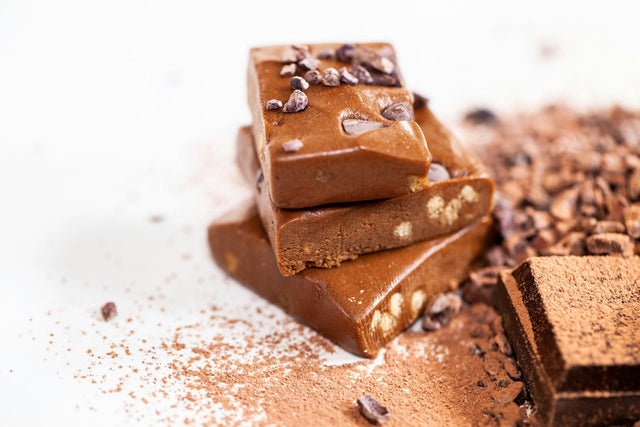Looking to shed those extra pounds? Protein shakes might just be your secret weapon. Packed with essential nutrients and low in calories, protein shakes have become a popular choice for weight loss enthusiasts. But do they really live up to the hype? Let's dig in and find out.
Protein shakes are a convenient and easy way to increase your protein intake, which can help curb cravings, boost metabolism, and build lean muscle mass. They are especially beneficial for those looking to maintain or lose weight. By replacing a meal or snack with a protein shake, you can feel fuller for longer without consuming excessive calories. Plus, protein is known to support muscle recovery and growth after workouts, helping you achieve your fitness goals.
However, not all protein shakes are created equal. It's important to choose a high-quality product that suits your dietary needs and taste preferences. With so many options available on the market, finding the right one can be a daunting task.
In this article, we will dive into the world of protein shakes, exploring their benefits, potential downsides, and how to choose the best one for your weight loss journey. Whether you're a fitness enthusiast or a newbie on the weight loss bandwagon, protein shakes may just be the secret weapon you've been searching for.
How Do Protein Shakes Aid Weight Loss?
Protein shakes have become a go-to supplement for those looking to shed pounds and improve body composition. Their blend of convenience, nutrient density, and versatility makes them an ideal choice for anyone aiming to lose weight while preserving lean muscle. Below, we explore the core reasons protein shakes support weight loss and how to choose the right one for your goals.
Increase Fullness and Curb Hunger
Protein shakes are effective for weight loss primarily due to their ability to increase satiety and reduce overall calorie intake. Protein is more satiating than carbohydrates or fats, helping you feel full longer after meals and reducing the urge to snack between them.
A 2008 study published in the American Journal of Clinical Nutrition found that high-protein diets significantly increased satiety and reduced subsequent calorie intake compared to high-fat diets (Westerterp-Plantenga et al., 2008).
By reducing hunger, protein shakes can help you maintain a caloric deficit—an essential factor for fat loss. They're especially useful between meals or post-workout when hunger can spike.
Maintain Lean Muscle Mass
One of the biggest risks during weight loss is losing muscle along with fat. Protein shakes help protect against this by providing the necessary amino acids to preserve and repair muscle tissue.
Muscle mass is metabolically active, meaning it burns more calories at rest compared to fat. A 2016 meta-analysis in Advances in Nutrition emphasized the importance of protein intake during caloric restriction to maintain lean mass (Pasiakos et al., 2016).
Whether you’re strength training or simply lowering your calorie intake, using protein shakes ensures you're supporting muscle preservation, which is vital for long-term weight loss success and metabolic health.
A Convenient Way to Hit Daily Protein Goals
In today’s fast-paced lifestyle, preparing whole-food meals for every protein requirement isn’t always realistic. Protein shakes offer a fast, convenient alternative that helps you meet your daily macronutrient goals without compromising on nutrition.
Having access to quick, nutritious options makes it easier to stick to your weight loss plan—especially during busy mornings, work commutes, or post-workout recovery. Convenience can be the key to consistency, which is where real results come from.
The Role of Protein in Weight Loss
1. Thermic Effect of Food (TEF)
Protein has a higher thermic effect compared to other macronutrients. The body burns more calories digesting protein, typically around 20–30% of the calories in protein are used during digestion and absorption, compared to 5–10% for carbs and 0–3% for fats (Halton & Hu, 2004, J Am Coll Nutr).
2. Hormonal Appetite Control
Consuming protein triggers the release of appetite-suppressing hormones such as peptide YY (PYY) and glucagon-like peptide-1 (GLP-1). These hormones signal to your brain that you are full, helping you naturally reduce calorie intake (Leidy et al., 2015, Obesity).
3. Recovery and Repair Post-Exercise
After training, especially resistance workouts, your muscles undergo microscopic damage. Protein is essential for the recovery process, helping muscles rebuild stronger, which can enhance fat loss and body composition over time.
Different Types of Protein Shakes
Whey Protein
Whey protein, derived from milk, is a complete protein with all nine essential amino acids. It's fast-digesting, making it ideal for post-workout recovery. Whey protein isolate, in particular, contains minimal lactose and a higher protein concentration.
Recommended Product: Swolverine Whey Protein Isolate
Plant Protein
For those following a plant-based diet, pea protein, rice protein, and pumpkin seed protein offer excellent alternatives. These are often combined in blends to ensure a full amino acid profile and optimal bioavailability.
Recommended Product: Swolverine Plant Protein
Casein Protein
Casein digests more slowly than whey, making it ideal before bed to support overnight muscle repair. It can also help with satiety when used between meals.
Collagen Protein
Collagen is increasingly popular for joint, skin, and gut health. While not a complete protein on its own, it's often used alongside other protein types to enhance overall wellness.
Choosing the Right Protein Shake for Weight Loss
1. Prioritize Quality Ingredients
Look for protein shakes that are free from artificial sweeteners, added sugars, and fillers. Aim for 15–30 grams of protein per serving and check for third-party testing or quality assurance labels.
2. Match Your Dietary Preferences
-
Lactose intolerant? Choose whey isolate, plant-based, or egg white protein.
-
Vegan? Look for blends made from pea, rice, or hemp protein.
-
Allergies? Double-check for common allergens like soy, gluten, or nuts.
3. Taste and Texture Matter
If you enjoy the taste and consistency of your shake, you're more likely to use it consistently. Look for flavors and brands that suit your preferences. Many high-quality powders mix well with almond milk, oat milk, or water.
4. Watch the Calorie Count
A protein shake should support your weight loss, not sabotage it. Opt for products with low to moderate calories (100–250 kcal per serving) depending on whether you’re using them as snacks or meal replacements.
Final Thoughts: Protein Shakes as a Weight Loss Ally
When used strategically, protein shakes can promote fullness, support muscle maintenance, boost metabolic rate, and enhance recovery. They're not a magic bullet but can be a powerful tool in a well-rounded nutrition and training plan.
To maximize results:
-
Pair shakes with whole foods and balanced meals.
-
Track your protein intake to ensure you're meeting your goals.
-
Use protein timing (especially post-workout) to enhance recovery and preserve muscle.
For a deeper dive into protein's role in weight loss and optimal health, check out:
-
Protein Intake and Muscle Mass Maintenance (Murphy et al., 2016, Nutrients)
-
High-Protein Diets and Weight Loss (Leidy et al., 2011, Nutrition & Metabolism)
How Do Protein Shakes Aid Weight Loss?
Protein shakes are more than just a supplement for athletes and bodybuilders — they’re a strategic tool for individuals seeking sustainable fat loss and improved body composition. By enhancing satiety, preserving lean muscle, and offering nutritional convenience, protein shakes can help you stay on track with your weight loss goals. Below, we break down how protein shakes work, their types, and how to use them effectively in your routine.
Increase Fullness and Curb Hunger
Protein is the most satiating macronutrient, making it particularly effective for reducing hunger and caloric intake throughout the day. Protein shakes deliver a concentrated dose of high-quality protein, helping you feel fuller for longer and minimizing snacking.
A study published in the American Journal of Clinical Nutrition found that increased protein intake significantly enhances satiety, reduces late-night cravings, and supports long-term weight management (Westerterp-Plantenga et al., 2008).
By curbing appetite, protein shakes can help maintain a caloric deficit—a key component for weight loss success.
Maintain Lean Muscle Mass
During weight loss, it’s common to lose both fat and muscle. Preserving lean muscle is critical because muscle tissue increases your resting metabolic rate, helping you burn more calories even at rest.
According to research published in Advances in Nutrition, a higher protein intake during caloric restriction helps maintain muscle mass and metabolic rate (Pasiakos et al., 2015).
Using protein shakes daily ensures you meet your protein targets, especially when in a calorie deficit or following a structured workout routine.
A Convenient Way to Hit Protein Targets
One of the greatest advantages of protein shakes is convenience. When time is limited or you're on the go, blending a shake takes minutes and can replace a meal or snack without compromising your nutritional needs.
This ease of use plays a big role in adherence, especially for individuals who struggle to prepare multiple protein-rich meals each day. A high-protein diet has been shown to improve compliance and produce greater fat loss over time (Leidy et al., 2015, Obesity).
The Role of Protein in Weight Loss
Higher Thermic Effect
Protein has a higher thermic effect of food (TEF) compared to carbohydrates or fats. That means your body uses more energy to digest protein, contributing to greater total daily energy expenditure.
TEF for protein can reach up to 30%, while carbs and fats typically hover between 5–10% and 0–3%, respectively (Halton & Hu, 2004, J Am Coll Nutr).
Appetite Hormone Regulation
Protein also influences hormones that regulate appetite. It increases levels of peptide YY (PYY) and GLP-1, which reduce hunger, while lowering levels of the hunger hormone ghrelin.
A controlled trial published in The American Journal of Clinical Nutrition found that individuals consuming higher protein experienced greater hormonal signals for satiety, leading to reduced energy intake (Weigle et al., 2005).
Supports Muscle Repair
Protein is essential for repairing and rebuilding muscle tissue post-exercise. Consuming a protein shake post-workout helps stimulate muscle protein synthesis, reduce soreness, and prepare the body for your next training session.
Different Types of Protein Shakes
Whey Protein
Whey protein is derived from milk and is considered a complete protein with all nine essential amino acids. It is quickly absorbed, making it perfect for post-workout recovery.
Recommended Product: Swolverine Whey Protein Isolate
Plant-Based Protein
Vegan protein powders are commonly made from pea, rice, or pumpkin seed protein. These blends are ideal for individuals who are lactose intolerant or follow a plant-based lifestyle, and they often include complementary proteins to ensure a complete amino acid profile.
Recommended Product: Swolverine Plant Protein
Casein Protein
Casein digests more slowly than whey, offering a slow-release amino acid profile that’s ideal for overnight muscle repair or longer periods between meals.
Collagen Protein
Collagen supports joint, skin, and gut health and is commonly included in wellness-focused protein blends. It’s not a complete protein but pairs well with other sources for a full spectrum of amino acids.
Choosing the Right Protein Shake for Weight Loss
Look for Clean Labels
Choose products with minimal added sugars, natural ingredients, and no artificial additives. Aim for 15–30 grams of protein per serving to meet your dietary needs.
Consider Dietary Needs
-
Lactose Intolerant? Go for whey isolate or plant-based options.
-
Vegan? Select plant proteins like pea or rice.
-
Allergy-sensitive? Read labels carefully to avoid common allergens like soy, dairy, or gluten.
Taste and Texture Preferences
Flavor matters. If you enjoy the taste and mouthfeel, you’re more likely to stick to your plan. Try various flavors and base liquids (almond milk, water, coconut milk) to find what works for you.
Monitor Caloric Intake
Protein shakes should complement your calorie goals. For fat loss, choose options with moderate calories—typically 100 to 250 per serving—depending on whether it's a snack or meal replacement.
Incorporating Protein Shakes Into Your Weight Loss Plan
Integrating protein shakes into your daily routine can be simple and impactful when done with intention. One of the most effective ways is as a meal replacement, especially for breakfast. A well-balanced shake with protein, healthy fats, and complex carbohydrates can keep you full and energized until your next meal.
Protein shakes are also great as strategic snacks between meals. Drinking a shake in the afternoon can help stabilize energy levels and prevent late-day hunger that often leads to poor food choices.
Additionally, post-workout shakes are key for muscle recovery, particularly after strength or high-intensity sessions. Replenishing with protein helps reduce muscle breakdown, supporting long-term body composition improvements.
Protein Shake Recipes for Weight Loss
Banana Protein Shake
-
1 scoop vanilla or chocolate protein powder
-
1 ripe banana
-
1 tbsp almond butter
-
1 cup unsweetened almond milk
This shake provides a nutrient-dense, high-protein breakfast or recovery option with a creamy texture and naturally sweet flavor.
Berry Protein Smoothie
-
1 cup mixed berries (strawberries, blueberries, raspberries)
-
1 scoop protein powder
-
1 cup spinach
-
1 cup coconut water or almond milk
This antioxidant-rich smoothie is low in calories but high in fiber and vitamins, making it perfect for weight management.
Chocolate Peanut Butter Shake
-
1 scoop chocolate protein powder
-
1 tbsp natural peanut butter
-
½ banana
-
1 cup unsweetened almond milk
This indulgent-tasting option supports satiety and cravings without derailing your goals.
Precautions and Considerations When Using Protein Shakes for Weight Loss
While protein shakes offer numerous benefits, it’s important to use them wisely. They should supplement a whole food diet, not replace it entirely. Over-reliance on shakes can lead to nutrient deficiencies, as they may lack essential vitamins, minerals, and fiber found in whole foods.
Also, avoid overconsumption. Too much protein—especially from supplements—can place stress on the kidneys over time, particularly in individuals with pre-existing renal issues (Martin et al., 2005, Nutrition & Metabolism).
Always read labels carefully. Many commercial shakes contain added sugars, preservatives, or artificial flavors that can sabotage weight loss efforts. Choose clean, third-party-tested protein powders that prioritize high-quality protein sources.
Other Benefits of Protein Shakes
Beyond fat loss, protein shakes support muscle recovery, immune health, and body recomposition. After a workout, consuming a protein shake helps reduce muscle soreness and repair tissues faster, allowing for improved performance in future sessions.
Protein is also essential for immune system function, contributing to the formation of antibodies and immune cells that protect the body from infections (Calder, 2006, British Journal of Nutrition).
Finally, by combining protein shakes with a resistance training program and a slight caloric deficit, individuals can lose body fat while preserving or even gaining muscle mass, leading to a leaner, stronger physique over time.
Conclusion and final thoughts
In conclusion, protein shakes can indeed be a secret weapon for weight loss when used effectively. They offer a convenient and nutrient-dense way to increase protein intake, curb cravings, and support muscle recovery. However, it is essential to choose high-quality protein shakes, incorporate them wisely into a balanced diet, and be mindful of your overall nutritional needs.
As you embark on your weight loss journey, consider incorporating protein shakes as part of a holistic approach that includes regular physical activity, whole foods, and mindful eating practices. By doing so, you can maximize the benefits of protein shakes while working toward your health and fitness goals. With the right mindset and strategies, protein shakes can become a valuable ally in your quest for a healthier, fitter you.
Looking For An Amazing Whey Protein Isolate To Help You Lose Weight?
Swolverine's rich and creamy Whey Protein Isolate is packed with 26 grams of ultra-pure cold-pressed, micro-filtered Whey Protein Isolate per serving. Sourced from the happiest grass-fed cows in America free of rBGH (recombinant bovine growth hormone), our Whey Protein Isolate is loaded with the building blocks you need, to build your athletic performance and strength.* We'll turn your post-workout shake into the most exciting part of your workout.
SWOLVERINE IS AN ENDURANCE ATHLETE AND ACTIVE LIFESTYLE BRAND. MADE FOR THE ELITE ATHLETE, AND THE STRONG-WILLED OUR PRODUCTS WERE DESIGNED TO FUEL YOUR ATHLETIC PERFORMANCE. WE PERFORM WHEN YOU PERFORM.
We believe that everyone can optimize not only their athletic performance but their human potential. The way we believe we can optimize performance is through transparency, clinically effective doses, and clinically proven ingredients with evidence-based outcomes. We provide the nutrients you need to power your active lifestyle.







